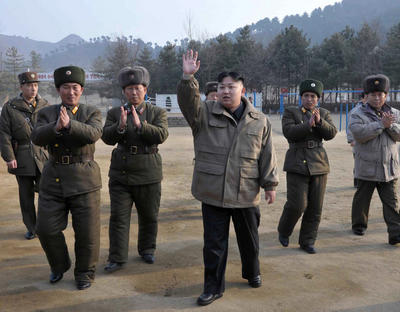These appointments demonstrate that the succession system, with Kim Jong-un as the core person, has been stabilised.
Currently, there are three major powers that are adjuvant to the Kim Jong-un regime in North Korea.
First is the Kim family system, which is now headed by Kim Jong-un’s uncle, Jang Sung-taek, and aunt, Kim Kyong-hui. Jang serves as the Vice Chairman of the National Defence Commission, and as a Chief Minister of the Party Central Committee. Together they control the major power of the Korean Workers’ Party, the government and the military — and have established a broad political power base within the Korean government and military systems.
Second are the old-guard politicians. They could be represented by Kim Yong-nam, the chairman of the Supreme People’s Assembly Committee. They have been trusted by the three generations of leaders (Kim Il-sung, Kim Jong-il and Kim Jong-un), and they also have high national prestige. They will continue to support the Kim Jong-un regime.
Third are the military forces, which could be represented by the chief of staff, Ri Yong-ho, and the Minister of the People’s Armed Forces, Kim Yong-chun. They have all shown loyalty to the Kim Jong-un regime. After the death of Kim Jong-il, Kim Jong-un publicly issued his ‘first orders’ as supreme commander, proving his actual control over the army.
The support of the above three powers will help guarantee the smooth transition of power to the Kim Jong-un regime.
However, Kim Jong-un still faces a series of challenges.
First, Kim Jong-un has to build his own team. This will potentially enable a group of young politicians to enter the power centre. But this will also conflict with the old political system.
Second, the Kim Jong-un regime will initially continue the ‘military-first’ politics of the Kim Jong-il regime. Yet, once the Kim Jong-un regime gains stability, it will have to face up to economic development pressures, improving people’s livelihoods and opening up foreign economic cooperation, which may force the regime to modify the ‘military-first politics’ line, and weaken the military’s power. This will inevitably lead to a backlash and challenges from the armed forces.
Third, after the Kim Jong-un regime fully consolidates its grip on power, it might adjust the power structure of the Korean government and military. That is, the Kim Jong-un regime may strengthen the core of the Korean Workers’ Party’s leadership system and shift emphasis to the political path of the ‘party leader’ in order to gradually replace the ‘military-first’ politics. Therefore, if Kim Jong-un takes on the position of chairman of the Korean Workers’ Party Central Military Commission, there is a possibility that he will manoeuvre to replace the powers of the National Defence Commission with the Central Military Commission. He also might not install anybody as chairman of the National Defence Commission.
However, the current situation in North Korea will not necessarily trigger significant changes. After all, Kim Jong-un suffers from a lack of experience in governance, military leadership and political power. If Kim Jong-un attempts to make changes too quickly, to further the implementation of domestic and foreign policy adjustment — such as restructuring North Korea’s military and political power system and shifting from the ‘military-first’ politics to a ‘party leader’ political line — he will inevitably invite conflict or power struggle into the restructuring process.
With regard to the role of outside powers, China and US share common strategic interests in avoiding chaos and maintaining peace and stability on the Korean Peninsula. After the death of Kim Jong-il, ROK-US summit telephone talks declared that the US has no intention to interfere in the succession process. This indicates that the US will not put pressure on North Korea to promote its collapse and hopes to avoid conflict on the peninsula and to achieve peace and stability.
The US Assistant Secretary of State for East Asian and Pacific Affairs, Kurt Campbell, visited China recently in order to further exchange views with China concerning the situation in the DPRK and to coordinate policies toward North Korea. China’s strategy has been to maintain peace and stability on the peninsula, and to build a harmonious and stable strategic environment in Northeast Asia conducive to national development. Kim’s death has not changed the basic strategy of China toward the Korean Peninsula. The main basis of China’s Korean Peninsula policy is to comprehensively strengthen and support Kim Jong-un’s new North Korean regime. The main purpose of the US’ ‘return to Asia’ strategy is to strengthen its strategic influence in the Asia Pacific region, including the Korean Peninsula. It also includes preventing military provocation or possible war in the East Asia region through the strengthening of US-ROK, US-Japan and US-Australia military alliances, both bilaterally and multilaterally.
Therefore, China and the US have common strategic interests on the Korean Peninsula issue. They do not want chaos in the North Korean situation, the collapse of the regime, or a large-scale military conflict between the North and South. In resolving the North Korean nuclear crisis, the missile crisis and other issues, there is a wide range of cooperative space that China and the US can utilise. The two parties should strengthen their strategic coordination and communication with the DPRK in order to cope with any future crises and deal with the current challenges concerning the Korean Peninsula, and act to safeguard the peace and stability of the Korean Peninsula.
Wei Zhijiang is Professor and Director of the Institute of South Korea Studies at the School of Asia-Pacific Studies, Sun Yat-sen University.

